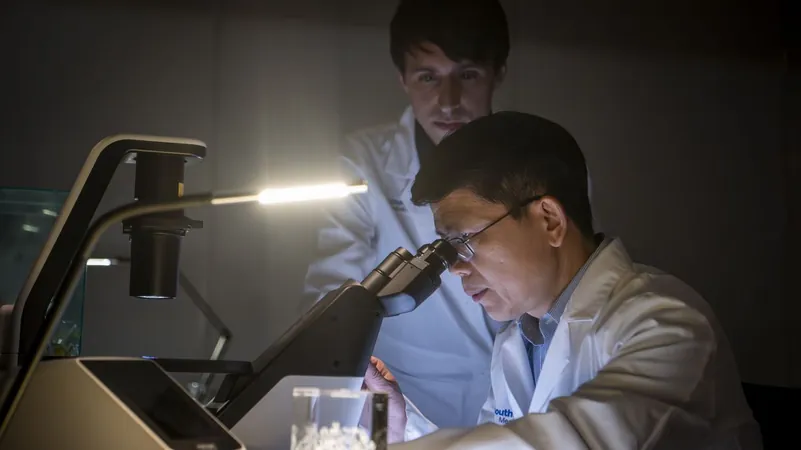
Groundbreaking Discovery: Scientist Wins $250,000 Lasker Prize for Unveiling Body’s ‘Fire Alarm’ Against Bacteria!
2024-09-19
Groundbreaking Discovery: Scientist Wins $250,000 Lasker Prize for Unveiling Body’s ‘Fire Alarm’ Against Bacteria!
In an impressive achievement for immunology, biochemist Zhijian “James” Chen has received the prestigious 2024 Albert Lasker Basic Medical Research Award, which comes with a $250,000 prize. Chen, a director at the Inflammation Research Center and a professor of molecular biology at the University of Texas Southwestern Medical Center, has made significant contributions to understanding how our immune system defends against invasive pathogens.
Chen's pioneering research has led to the discovery of cyclic GMP-AMP synthase (cGAS), a vital enzyme that acts as an early warning system in the body’s immune response. Much like a smoke detector, cGAS is activated by the presence of foreign DNA, which signals the immune system to gear up for an invasion. Prior to his work, scientists were unclear about how foreign DNA triggered the innate immune response, the body's first defense line against infections.
This discovery is monumental as it builds upon historical research by seminal figures like Ilya Mechnikov, who introduced the concept of phagocytosis over a century ago. Mechnikov noted that bacterial DNA arouses a "protective army" of immune cells, yet the mechanisms at play remained elusive until recent advancements.
In the early 2000s, scientists uncovered that injecting cells with DNA produced a surge in interferons—crucial immune signals that combat infections. A pivotal set of genes called “stimulator of interferon genes” (STING) was identified, but the direct connection to foreign DNA was still undefined until Chen's groundbreaking research began to connect the dots.
From their work published in 2012 and onwards, Chen's team identified that when foreign DNA infiltrates cells, cGAS generates a molecule called cGAMP. This molecule activates STING, propelling a robust immune response to thwart infections. Moreover, the cGAS-cGAMP-STING pathway has been found to detect not only DNA but also RNA viruses like HIV, a virus notorious for evading immune detection.
However, there is a darker side to this discovery. The cGAS system is not always beneficial; it can also trigger unwanted immune responses, particularly in autoimmune diseases where the immune system erroneously attacks the body’s own cells. Under stress conditions, human DNA can escape from its cellular compartments, leading to confusion for the immune system, which might mistakenly think there is an infection.
Researchers, including Chen, have observed that in some individuals, enzymes meant to degrade this escaped DNA may malfunction, inadvertently activating the cGAS signal. This misfire could potentially exacerbate conditions such as autoimmune diseases, inflammatory illnesses, and neurodegenerative disorders like Parkinson's and Alzheimer's disease.
Chen's discovery opens up promising avenues for medical interventions aimed at modulating the cGAS pathway, potentially benefiting a wide array of diseases by addressing harmful immune reactions.
In addition to Chen's groundbreaking work, two other Lasker Awards were presented this year—one for clinical research recognizing the landmark work in obesity treatments with glucagon-like peptides, and a public service award honoring the impactful contributions in the global fight against HIV by scientists Quarraisha Abdool Karim and Dr. Salim Abdool Karim.
As immunology continues to evolve, Chen's research stands out as a beacon of hope for innovative therapies aimed at reclaiming immune balance in the fight against various diseases.



 Brasil (PT)
Brasil (PT)
 Canada (EN)
Canada (EN)
 Chile (ES)
Chile (ES)
 España (ES)
España (ES)
 France (FR)
France (FR)
 Hong Kong (EN)
Hong Kong (EN)
 Italia (IT)
Italia (IT)
 日本 (JA)
日本 (JA)
 Magyarország (HU)
Magyarország (HU)
 Norge (NO)
Norge (NO)
 Polska (PL)
Polska (PL)
 Schweiz (DE)
Schweiz (DE)
 Singapore (EN)
Singapore (EN)
 Sverige (SV)
Sverige (SV)
 Suomi (FI)
Suomi (FI)
 Türkiye (TR)
Türkiye (TR)